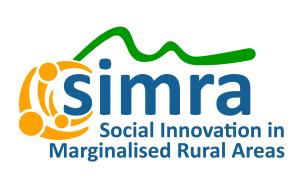 The Horizon 2020 project SIMRA (Social Innovation in Marginalised Rural Areas) aims to categorise and understand social innovation in different settings (thanks to case studies), to develop an integrated set of methods for the evaluation of social innovation and its impact on rural areas, to analyse the success factors for social innovation and disseminate new knowledge to policy-makers.
The Horizon 2020 project SIMRA (Social Innovation in Marginalised Rural Areas) aims to categorise and understand social innovation in different settings (thanks to case studies), to develop an integrated set of methods for the evaluation of social innovation and its impact on rural areas, to analyse the success factors for social innovation and disseminate new knowledge to policy-makers.
SIMRA wishes to use interactive methods to better involve stakeholders. With that intention, the project team organised the 1rst workshop of the Social Innovation Think Tank (SITT), which Euromontana attended, to launch the dialogue with the stakeholders. The SITT workshop took place on October 26th – 28th 2016 in Bratislava and was a success for the project team. We received helpful feedback from stakeholders on the SIMRA progress made since April.
Systematic knowledge exchange and learning process in understanding and assessing social innovations for marginalised rural areas was the main objective of the first transdisciplinary workshop hosted by the centre of excellence SPECTRA – joint research centre of the Institute of Forest Ecology Slovak Academy of Sciences, Slovak University of Technology and Comenius University in Bratislava.
Members of the SIMRA consortium (consisting of 26 partners from 15 countries) met for the first time with more than 20 members of the SOCIAL INNOVATION THINK TANK (SITT, consisting of European, Associated and non-EU experts in forestry, agriculture and rural development). They have started working well together.
The questions considered included: What are the overall and specific variables of the emergence of social innovation in marginalised rural areas? How do they affect a range of success factors and the lessons learned in different rural areas? What are the most appropriate approaches, methods and tools that can be used for assessing social innovations? What does policy support to social innovation mean in different regional settings and contexts?
Being co-leader of Work Package 7 on communication and dissemination, Euromontana discussed the communication tools defined so far for the project with the stakeholders and asked them for their feedback on how to make these tools more interactive and innovative. Euromontana received interesting suggestions to further improve the communication and dissemination of the project.
You can read the full press release on SIMRA’s website, by clicking here.
9 November 2016









